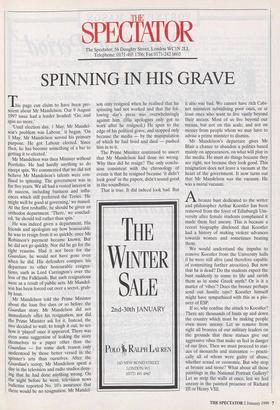SPECTATOR
The Spectator, 56 Doughty Street, London WC1N 2L Telephone: 0171-405 1706; Fax 0171-242 0603
SPINNING IN HIS GRAVE
his page can claim to have been pre- scient about Mr Mandelson. Our 9 August 1997 issue had a leader headed: `Go, and spin no more.'
`Until election day, 1 May, Mr Mandel- son's problem was Labour,' it began, 'On 1 May, Mr Mandelson served his primary purpose. He got Labour elected. Since then, he has become something of a bar to getting it re-elected.' Mr Mandelson was then Minister without Portfolio. He had hardly anything to do except spin. We commented that we did not believe Mr Mandelson's talents were con- fined to spinning. The government was in for five years. We all had a vested interest in its success, including business and influ- ences which still preferred the Tories. 'He might well be good at governing,' we mused. At the first reshuffle, he should be given an orthodox department. 'There,' we conclud- ed, 'he should toil rather than spin.'
He was indeed given a department. His friends and apologists say how honourable he was to resign from it so quickly, once Mr Robinson's payment became known. But he did not go quickly. Nor did he go for the right reasons. Had it not been for the Guardian, he would not have gone even when he did. His defenders compare his departure to other honourable resigna- tions, such as Lord Carrington's over the loss of the Falklands. But such resignations were as a result of public acts. Mr Mandel- son has been forced out over a secret, grub- by loan.
Mr Mandelson told the Prime Minister about the loan five days or so before the Guardian story. Mr Mandelson did not Immediately offer his resignation, nor did the Prime Minister ask for it. Instead, the two decided to wait, to tough it out, to see how it 'played' once it appeared. There was even some suggestion of leaking the story themselves to a paper other than the Guardian — for some dark reason only understood by those better versed in the spinner's arts than ourselves. After the Guardian's scoop, Mr Mandelson spent a day in the television and radio studios deny- ing that he had done anything wrong. On the night before he went, television news bulletins reported No. 10's assurance that there would be no resignation. Mr Mandel- son only resigned when he realised that his spinning had not worked and that the fol- lowing day's press was overwhelmingly against him. (His apologists only got to work after he resigned.) He spun to the edge of his political grave, and stopped only because the media — by the manipulation of which he had lived and died — pushed him in to it.
The Prime Minister continued to assert that Mr Mandelson had done no wrong. Why then did he resign? The only conclu- sion consistent with the chronology of events is that he resigned because it didn't look good' in the papers, didn't sound good in the soundbites.
That is true. It did indeed look bad. But it also was bad. We cannot have rich Cabi- net ministers subsidising poor ones, or at least ones who want to live vastly beyond their means. Most of us live beyond our means, but not on this scale; and not on money from people whom we may have to advise a prime minister to dismiss.
Mr Mandelson's departure gives Mr Blair a chance to abandon a politics based mainly on appearances, on what will play in the media. He must do things because they are right, not because they look good. This resignation does not leave a vacuum at the heart of the government. It now turns out that Mr Mandelson was the vacuum. He was a moral vacuum.
bronze bust dedicated to the writer and philosopher Arthur Koestler has been removed from the foyer of Edinburgh Uni- versity after female students complained it made them feel uneasy. This is because a recent biography disclosed that Koestler had a history of making violent advances towards women and sometimes beating them.
We would understand the impulse to remove Koestler from the University halls if he were still alive (and therefore capable of committing further atrocities). But now that he is dead? Do the students expect the bust suddenly to come to life and ravish them as in some Greek myth? Or is it a matter of 'vibes'? Does the bronze perhaps send out hostile rays? Koestler himself might have sympathised with this as a pio- neer of ESP.
If so, why confine the attack to Koestler? There are thousands of busts up and down the country which must be making people even more uneasy. Let us remove from sight all bronzes of our military leaders on the grounds that these statues give out aggressive vibes that make us feel in danger of our lives. Then we must proceed to stat- ues of monarchs and statesmen — practi- cally all of whom were guilty of abuse, whether sexual or economic. But why stop at bronze and stone? What about all those paintings in the National Portrait Gallery? Let us strip the walls at once, lest we feel uneasy in the painted presence of Richard III or Henry VIII.
A


























































 Previous page
Previous page